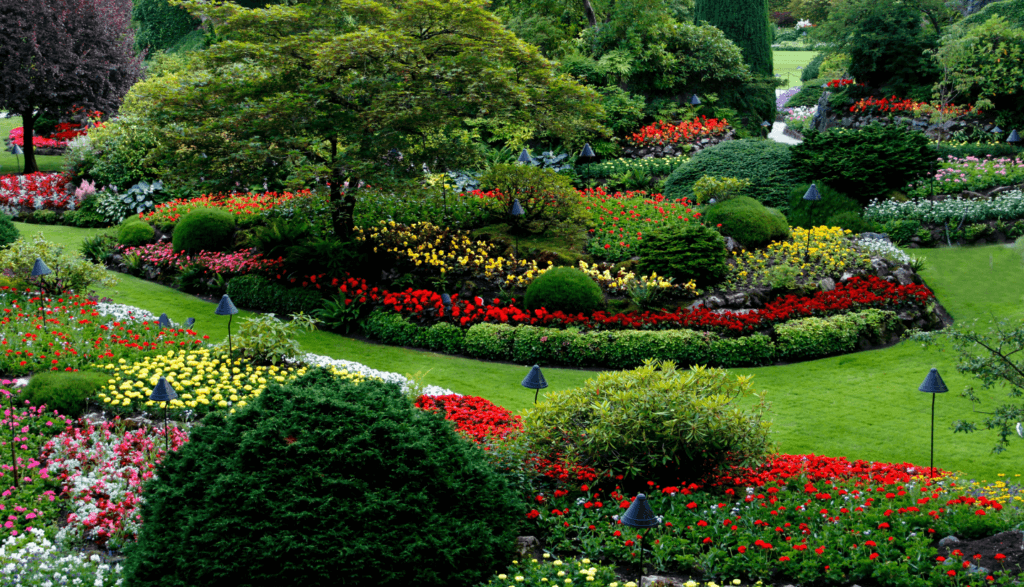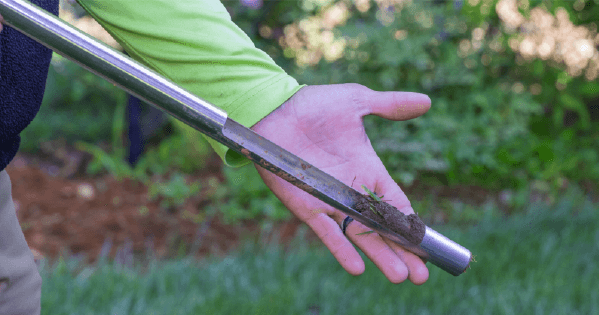Lawn biodiversity: The Importance of Varied Plant Species

Lawn biodiversity refers to the variety of plant and animal species present in the lawn’s ecosystem. In a healthy, biodiverse lawn, there is a rich assortment of grasses, flowers, shrubs, and even trees co-existing with insects, birds, and small animals such as squirrels.
Why is having a variety of plants important?
Having a diverse lawn ecosystem can bring many benefits including:
- Ecological balance: Different species contribute to the overall health and resilience of the lawn ecosystem. Each species plays a specific role in nutrient cycling, pest control and pollination.
- Improved soil health: Various plant species help maintain soil structure, prevent erosion, and enhance fertility through the infusion of nitrogen and organic matter.
- Pollinator Support: Flowering plants attract bees, butterflies and other pollinators, such as hummingbirds, contributing to the pollination of nearby flower- and fruit-bearing plants and trees.
- Pest Control: A diverse range of plant species can deter pests and provide habitats for natural predators, reducing the need for chemical pesticides.
- Aesthetic Appeal: With its mix of colors, textures, and heights, a biodiverse lawn can be quite beautiful and create a more natural and dynamic landscape.
Promoting lawn biodiversity can also involve incorporating native plants and creating habitats that include water sources such as streams and ponds.
What types of plants grow well together?
Incorporating native trees, shrubs, flowering plants, grasses, and other perennials creates a lush landscape that not only creates curb appeal but also a thriving ecosystem. Georgia boasts a host of native plant species that thrive in the state’s varied climates and habitats.
The Eastern Redbud is a small tree known for its pink flowers that bloom in early spring.
The Southern Magnolia is an iconic tree with large, fragrant white flowers and glossy evergreen leaves.
The Georgia Aster is a perennial wildflower with purple blooms that attract pollinators like butterflies and bees.
Vining plants such as the Carolina Jessamine with its yellow trumpet flowers, bring a burst of color in late winter and early spring as migrating hummingbirds begin their northward trek.
Eastern Purple Coneflowers are herbaceous perennials with purplish pink daisy like flowers that bloom in the summertime and attract pollinators.
Yaupon Holly is a small evergreen shrub with red berries that are a food source for birds.
These are just a few of Georgia’s native plants that thrive in Georgia’s ecosystems, supporting local wildlife, promoting water conservation, and enhancing the overall beauty of the landscape.
Which grasses should be included?
The best grass for your Georgia lawn depends on location, soil type, sun exposure, and intended use of the turfgrass. Several grasses grow well in Georgia’s diverse climate and soil conditions.
Warm season grasses
- Bermuda Grass is one of the most popular warm-season grasses in Georgia due to its high heat and drought tolerance, rapid growth, and resistance to wear. It’s commonly used for residential lawns, athletic fields, and golf courses.
- Zoysia grass varieties such as Emerald, Meyer, and Zeon are attractive to homeowners during the warm seasons, but this type of grass will turn brown in the winter and tends to have a slower green-up in the spring.
- Fescue Grass including tall fescue are cool season grasses that offer good shade tolerance and stay green year-round in mild climates.
When selecting a grass for your lawn in Georgia, consider factors such as climate, soil type, maintenance requirements and intended use. Additionally, consult with local experts or extension services for specific recommendations for your location within the state.
What plants should be avoided?
Invasive species such as ornamental plants that are susceptible to pests and diseases should be avoided when creating a lawn that is ecosystem-friendly. Avoid plants that require a lot of water, high-maintenance turfgrasses, and exotic groundcovers that form dense mats and smother native plants.
Simply Green can help!
Now is the perfect time to start planning changes for your landscape to incorporate native plants and trees this spring. Simply Green Lawn Care Plus experts can help you get started by determining your soil structure and making sure it’s healthy for planting your native landscape. Contact Simply Green today for a consultation.
About Simply Green Lawn Care

Simply Green aims to provide the highest quality lawn care, mosquito control, and lawn pest control services to Georgia residents.
We are locally owned and operated which allows us to be accessible, attentive, and responsive for customers in Georgia.
Our well-trained team is easy to work with and determined to exceed expectations.
All our plant health care specialists are Georgia Department of Agriculture Certified and maintain their Category 24 applicators license.


